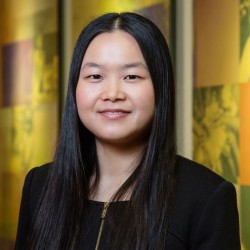Xiaoling Xiang
Associate Professor of Social Work
Dr. Xiang’s research is dedicated to enhancing the health and well-being of older adults, aiming for a state of complete physical, mental and social wellness. Her work spans two primary areas: fundamental social science research and applied intervention research.
In her fundamental research, Xiang investigates the interplay between physical functioning, disability, mental health, and cognition. She has worked on over a dozen national surveys, including the Health and Retirement Study (HRS) and the National Health and Aging Trends Study (NHATS). Her numerous publications frequently feature advanced statistical techniques such as different types of survival analysis, SEM, GLMMs, and quasi-experimental methods.
In her applied intervention research, Xiang focuses on developing and implementing digital mental health interventions for home- and community-based settings. This work is distinguished by intensive community engagement, a user-centered approach, and the use of mixed methods. One notable project is Empower@Home, an internet-delivered psychotherapy program tailored for older adults with depression. Xiang worked closely with a dozen aging services organizations, older adults and other stakeholders, conducting over 100 partnership meetings to shape the intervention. She led the team in refining the program materials four times, including a complete redesign of the multimedia content. The process, outlined in a peer-reviewed article, was highly user-centered, with rapid changes made in response to participant feedback.
Xiang is currently the principal investigator on two federal grants: an R01 award from the National Institute of Mental Health (R01MH137064) and a Field Initiated Project award from the National Institute on Disability, Independent Living, and Rehabilitation Research (90IFRE0097). These projects aim to test the real-world effectiveness and implementation of Empower@Home when supported by various social service providers and laypersons.
Additionally, Xiang is expanding her research to include the application of artificial intelligence. A recent example of this work is her study on ageism during the COVID-19 pandemic, published in the Journals of Gerontology, which employs topic modeling and classification techniques to analyze tweets.
Xiang is available to mentor PhD students.
Research Interests/Focus
Aging and mental health, late-life depression, chronic disease, comorbidity, digital mental health intervention, implementation research and applied artificial intelligence.
Contact Information
| Phone | Room | Address | |
|---|---|---|---|
| (734) 763-6581 | [email protected] | 3735 SSWB | University of Michigan School of Social Work 1080 S. University Ave. Ann Arbor, MI 48109 |
Education
| Year | Degree | School | |
|---|---|---|---|
| 2015 | PhD | Social Work | University of Illinois, Urbana-Champaign |
| 2015 | MSW | Macro | University of Illinois, Urbana-Champaign |
| 2011 | MPhil | Social Welfare | Chinese University of Hong Kong, CHINA |
| 2009 | BA | Social Work and Sociology | Peking University, Beijing, CHINA |
